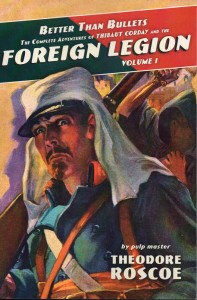Book Review: Better than Bullets: The Complete Adventures of Thibaut Corday and the Foreign Legion Volume 1 by Theodore Roscoe
The Légion étrangère was created in 1831 as a way to remove disruptive elements from French society, primarily foreigners of all sorts, and put them to good use fighting far away. Their first and primary posting was in Algeria, but the French Foreign Legion has fought in all of France’s wars, even to the present day.
Fiction created a romanticized version of the Legion as a haven for lost men, criminals escaping their pasts and disappointed lovers. Most influential in this field was Beau Geste by P.C Wren, about a trio of brothers joining the unit. Naturally, the pulp magazines also loved the Legion, especially during the 1920s and ’30s. One of the most popular series of stories appeared in Argosy from 1929 to 1939, the tales of a retired Legionnaire named Thibaut Corday.
Corday is an elderly man, though his beard is still a rich cinnamon hue. He served in the Confederate army during the American Civil War before enlisting in the Legion, and has seen many strange things, which he is willing to tell to people who will listen as he smokes at an Algerian café. This first volume has six stories.
“Better than Bullets”, the title story, introduces Corday and his buddies, Yankee Bill the Elephant and Christian(ity) Jensen the Dane. They’re stationed near Casablanca and out of edible food, so Bill suggests they go on an unauthorized forage expedition. They have to leave their weapons behind, so when the trio is cornered by fanatical Muslim enemies, there’s not a bullet or blade to be had. Thus they must improvise! As might be suspected, through all of these stories Corday shows a strong prejudice against people of color and Muslims. He does admit from time to time that as the French are an invading/occupying Army, the locals do have good reason for their hostility.
“The Dance of the Seven Veils” has Yankee Bill get into an altercation with a handsome rake over a dancing girl. The real trouble starts the next morning when our heroes discover the rake is their new commanding officer, who’s taking them on a seemingly doomed mission into the Sahara Desert. The fortress they’ve been assigned to crack seems impenetrable…until a ghostly dancer appears in the desert night. Pretty obvious twist, but evocative imagery.
“An Eye for an Eye” tells the tale of feuding cousins Hyacinth LaDu and “La Carotte” who are students at the military school of St. Cyr. They are already furious with each other when a lovely young woman comes along and provides an excuse for a duel. Hyacinth puts Carrot’s eye out deliberately. Years later, the two men meet again in the Foreign Legion. One of the twists is slightly hidden by the tradition of joining the Legion under an assumed name. A chilling tale of revenge.
“The Death Watch” changes things up with a horrific tale set at sea as the few Legionnaires aboard a troop transport have to deal with a mutiny by native soldiers. Massive coincidence plays a part in the outcome.
“The Bearded Slayer” is a tale of a quite young Corday, who was inordinately proud of his fearsome beard. Unfortunately, this same beard made him the primary suspect in a series of murders in a remote Legion outpost. The tension ratchets with each killing, and the mounting evidence against our hero.
“The Mutineer”, which closes out the volume, features both the secret origin and final fate of Yankee Bill the Elephant. He loudly declares his love for the beautiful daughter of the commander, in public no less. While pursued by military police for his insolence, Bill and Corday must also deal with a native uprising. The streak of sexism that was a minor point in other stories comes to the fore here, as it uses the old “if a woman says ‘no’, and ‘go away’ and ‘I hate you’, that means you should totally keep pestering her until you can prove your manliness and she falls in love with you” plotline I know many readers despise. Exciting story though.
There’s a nice introduction to the series, and two biographical sketches of Theodore Roscoe, one printed in Argosy at the time, and a more recent one.
While this is sterling pulp writing, full of excitement and twists, some readers may find the period sexism and racism too much for their tastes. On the other hand, if you loved other French Foreign Legion stories, this is a good selection.

